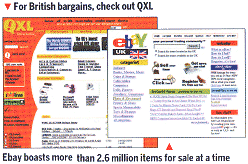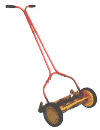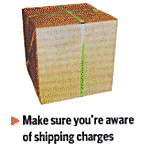 BUYING AND SELLING ONLINE
BUYING AND SELLING ONLINE
 BUYING AND SELLING ONLINE
BUYING AND SELLING ONLINE
Auction websites have turned the internet into the world's largest
boot sale. We show you how to sell your wares and browse for a bargain
Mention the word auction and most people will think of Sotheby's or
multi-million pound telephone bids. However, thousands of people who have
never been within a hundred yards of a Ming vase are trading in cyberspace.
But how do you get your unwanted goods and chattels up there for sale in
the first place or bid for something that takes your fancy? And, most
importantly, are you likely to get ripped off?
There are three big players in the UK. QXL
(www.qxl.com) is based
in London and has been up and running on the web since 1997, while
Ebay
(www.ebay.co.uk) is an American company
that has created a UK branch. The trio is completed by Loot
(www.loot.com), free
ads people, which also produces a daily newspaper full of sales and wanted
ads.
All auction sites are broadly similar although QXL is the only one of the
big three to directly auction its own range of goods. The other two act as
go-betweens for personal auctions - QXL also provides this service through
QXL Exchange.

What's for sale?
It might be quicker to ask what isn't for sale on the major auction sites.
Ebay, for example, boasts more than 2.6 million items for sale at any one
time. From collectable items such as CDs,stamps, cigarette cards and porcelain
through to new and used consumer goods like mobile phones, washing machines
and PC equipment, the choice is vast.
QXL is probably the better bet if you're interested in consumer electrical
goods, such as MiniDisc players and stereos. Ebay features countless items
of this type too, but also tends to specialise more in boot sale type
knick-knacks and bargains. All human life is here: you can bid for holidays
and flights on QXL, while on Ebay we uncovered items as diverse as a Czech
telescope and a signed photo of Margaret Thatcher.
The Loot site is not a dedicated auction site as such, but runs auctions
alongside its usual sales and ads site. This means that if you don't want
to slap a price tag on the item you're selling, you can invite bids for it
instead. And the range of goods on offer is pretty diverse.

On Ebay and QXL, the strength is new and second-hand computer-related items.
So, whether you need a new graphics card to spice up your PC or a whole new
computer, you'll find reams of products available. Read the descriptions
carefully and be sure that what you're bidding for is what you actually require
- for example, is that enticing
graphics
card an AGP or PCI version?
Getting personal
Don't be afraid to ask questions of the seller - they're as keen to sell
the product as you are to buy it, and their email address will be listed
alongside the item they're offering. QXL and Ebay also have well used chat
and message boards.
 Both
also provide a rating for the seller, based on what previous customers have
had to say about their dealings with them. If there's just one or two negative
remarks among a whole raft of positively glowing references, then it's fairly
safe to assume that the seller is on the level.
Both
also provide a rating for the seller, based on what previous customers have
had to say about their dealings with them. If there's just one or two negative
remarks among a whole raft of positively glowing references, then it's fairly
safe to assume that the seller is on the level.
Before you bid, always check the sale's conditions. Most sellers will expect you to pay postage and shipping charges, which can soon mount up.
Ebay has a far larger catalogue of goods up for sale than QXL, but this is chiefly due to the fact that it has combined its US and UK catalogues. And if goods are being sold in the US, this obviously presents complications with both shipping and finance. All of these are entirely surmountable, but bear in mind that it may not be so easy to sort out any hitches when you do buy from overseas.
 Bid for success
Bid for success
Okay, so you've decided that you fancy a piece of the action, but how do
you go about bidding? The first thing to do is to decide what kind of products
you're interested in - though one of the joys of buying on the internet is
that you can browse to your heart's content without being hassled for a wad
of notes.
When you find something that takes your fancy. it's a case of taking a look at the winning bid so far and beating it. You enter your member name and password, decide how much you want to bid, confirm that all the details are correct and that's it. There's a minimum increment by which you can increase the bid, which will depend on the value of the item being offered - perhaps 25p on a CD or £5 on an MP3 player.
You'll immediately be notified by email that your bid has been logged and, as soon as your bid is beaten, you'll be notified again so that you can go back and make a higher one.
 Most sites also have the option of gradually increasing your
hid automatically, up to a certain amount. This saves you the bother of having
to continually check back as bidding progresses
Most sites also have the option of gradually increasing your
hid automatically, up to a certain amount. This saves you the bother of having
to continually check back as bidding progresses
Something in reserve
Many items, especially new ones, will have a reserve price attached to them
- the minimum amount the seller will allow the item to go for, although you
won't be told what the exact amount is. So, if your winning bid doesn't match
the reserve price, then you won't get the item and it will be put back up
for auction at a later date.
While this might seem to mitigate against finding a real bargain, the reserve price is usually well below what you'd pay for the item at a high street store. This is good news if you've got an item to sell, because you won't be forced into selling it for many times less than its true value.
A BEGINNERS GUIDE TO ONLINE AUCTIONS |
|
| Buying DO carefully read the item description and check that it's exactly what you require. DON'T bid more than you can afford.It's sometimes possible to back out of a deal,but nobody likes a time-waster. DO take a look at other options,such as internet retail sites,and even high-street stores,before you engage in an online bidding war. DON'T expect to get away with paying less than the going rate.You're not going to walk off with a PC for just £10. |
Selling DO describe the item you're selling in as much detail as possible. DON'T be misleading in your descriptions. DO set a reserve price,but make it a reasonable one. DON'T leave it until the item has been sold to sort out who pays for insurance,postage and shipping. DO set a low price for the auction to start at,and allow bidding to rise in fairly small increments. |
Sold to the mouse over there
Putting an item up for sale is almost as easy as bidding for it. Having
registered (which only needs to he done once), you simply fill in the details
of the item you're selling, set a reserve price if you wish and enter the
amount at which people should start bidding.
Try and be as descriptive as possible about the item you're offering. If you have a digital camera you should include a photograph, and if it's an electrical or computer-related sale, make clear whether it's still covered by a guarantee.
Your sale will typically be on the site within minutes and after a week or
so the site will contact you with details of the winning bid. Then it's up
to you to manange the exchange of the goods and money. If possible, use Special
Delivery - that way you can keep track of whether or not the package was
delivered and it's insured by the Post Office should it go astray. If something
does go wrong, maintain polite contact with the buyer and try and sort the
problem out. As a last resort, contact the site itself - it's in their interest
to sort out the wrangle.
Both Ebay and QXL have their own forms of insurance if things go disastrously
wrong - check the exact details on their sites.
A degree of trust
Of course, the system stands and falls on the basis that both parties
trust one another to come up with the goods and money. However, there are
a number of safeguards in place, such as the ratings system discussed earlier,
which ensures people can't abuse the system
continually.
Both QXL and Ebay also operate a scheme whereby they act as middlemen. Both
parties fulfil their end of the bargain and then, once it's clear all is
above board, the goods and money will be forwarded. This takes longer, but
is useful if you're a little wary of taking the plunge.
Even though you're taking a calculated risk every time you bid for something - just as you would be if you were at a real auction - problems are really very rare. The widely reported cases of people trying to sell kidneys or the Millennium Dome are the exceptions, rather than the rule.
Over to you
The internet has succeeded in bringing auctions to the masses. It's a fun
and potentially rewarding way to buy and sell goods - and if you just can't
get round to putting that advert in the local paper, it could be the simplest
way to clear out your attic or complete a collection.
See also Ebay